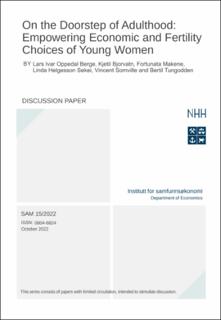| dc.description.abstract | We report from a large-scale randomized controlled trial of women empowerment in Tanzania investigating how two different empowerment strategies, economic empowerment and reproductive health empowerment, shape the economic and fertility
choices of young women when they transition into adulthood. The analysis builds on a rich data set (survey, experimental, and medical data) collected over more than five years. The economic empowerment reduces poverty, while teenage pregnancy increases with both economic and reproductive health empowerment. The increase in fertility comes from a positive income effect and by women entering earlier into a relationship. We also provide evidence of the importance of social norms and labor market flexibility in explaining the income and relationship effects on fertility. The findings provide new insights on the economics of fertility, and show the importance of a comprehensive approach to women empowerment. | en_US |
